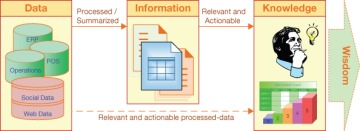Introduction to Business Analytics and Decision-Making
An overview of business analytics, its longitudinal perspective and a simple taxonomy, and where prescriptive analytics fits into this big picture. Also provides a thorough description of the human decision-making process.
Save 35% off the list price* of the related book or multi-format eBook (EPUB + MOBI + PDF) with discount code ARTICLE.
* See informit.com/terms
Business analytics is a relatively new term that has been gaining popularity in the business world like nothing else in recent history. Before diving into the specifics about business analytics and one of its echelons—prescriptive analytics, which is closest to the decision-making stage and the main focus of this book—it would be helpful to first define business analytics and how its echelons relate to managerial decision-making. In most general terms, business analytics is the art and science of identifying or discovering novel insight from large volumes and varieties of data by means of using sophisticated machine learning, mathematical, and statistical models to support more accurate and timely managerial decision-making. So, in a sense, business analytics is all about decision-making and problem-solving. Nowadays, business analytics can simply be stated as “the process of discovering meaningful and actionable insight in data.”
Data and Business Analytics
Because we are living in an era of data, the business analytics definitions are mostly focused on that—the digitization of data that is constantly flowing in, both from within and from outside the organization, in large quantities and many varieties. Figure 1.1 shows the process of creating information and knowledge through a systematic and scientific transformation of data. Various data, both structured and unstructured, is converted into knowledge and wisdom through a scientific process known as data analytics.

FIGURE 1.1 The process of converting data into information, knowledge, and wisdom.
Although the most current definitions of analytics are primarily data focused, there are and there have been many applications of analytics involving little or no data; instead, those analytics projects used mathematical models that relied on process description and expert knowledge (for example, optimization and simulation models, expert systems, and multi-criteria decision-modeling methods; all of which and more are explained in due details in the following chapters of this book).
Business analytics is the application of analytics models and methodologies, tools, and techniques to solve ever-so-complex business problems. Organizations commonly apply analytics to large collections of data to describe (better understand the internal factors), predict (foresee the future trends), and prescribe (find the best possible course of action) for improving business performance. Analytics have been shown to help firms do the following:
Improve their relationships with their customers (encompassing all phases of customer relationship management—acquisition, retention, enrichment), employees, and other stakeholders.
Identify fraudulent transactions and odd behaviors, saving firms money.
Enhance product and service features and their pricing, which leads to better customer satisfaction and profitability.
Optimize marketing and advertising campaigns, reaching more customers with the right kind of message and promotions with the least amount of expenses.
Minimize operational cost by optimally managing inventories and allocating resources to wherever and whenever they are needed by means of optimization and simulation modeling.
Empower employees with the information and insight they need to make faster and better decisions while they are facing customers or customer-related issues.
Analytics, perhaps because of its rapidly increasing popularity as a buzzword, is being used to replace several previously popularized terms such as intelligence, mining, and discovery. For example, the term business intelligence is now business analytics; customer intelligence is now customer analytics; Web mining is now Web analytics; and knowledge discovery is now data analytics. Because modern-day analytics can require extensive computation (due to the volume, variety, and velocity of data—the Big Data), the tolls, techniques, and algorithms used for analytics projects leverage the most current, state-of-the-art methods developed in fields that include management science, computer science, statistics, data science, computational linguistics, and mathematics.
As mentioned, analytics is all about problem-solving and decision-making. To better understand the motivation for business analytics and to further accentuate its role in managerial decision-making, in the following section we provide a brief discussion of the human decision-making process using one of the most widely cited decision theories.